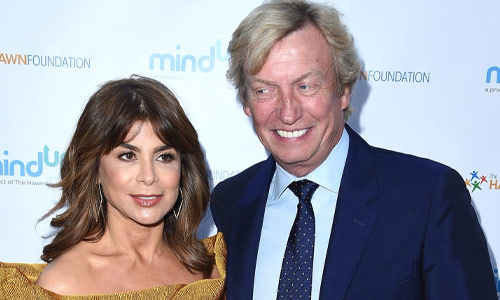- December 31, 2023
Iconic pop star Paula Abdul takes a courageous stand, filing a lawsuit against TV producer Nigel Lythgoe, alleging sexual assault and discrimination during their time on American Idol and So You Think You Can Dance. Abdul’s legal action sparks a crucial conversation about power dynamics in Hollywood. Uncover the details of this bold move, as Abdul confronts the shadows of her past.

In a seismic jolt to the entertainment industry, Paula Abdul, the acclaimed pop icon and former judge on American Idol and So You Think You Can Dance, has thrust herself into the heart of the #MeToo movement. Abdul recently filed a lawsuit against Nigel Lythgoe, a prominent producer associated with both iconic television shows, leveling allegations of sexual assault, harassment, gender violence, and negligence. This legal saga not only unveils a distressing narrative of mistreatment during Abdul’s time on these shows but also resonates with the broader conversations surrounding power dynamics and abuse in Hollywood.
Paula Abdul’s Allegations: A Chronicle of Distress
Abdul’s legal battle unfolds as a harrowing chronicle of degradation, discrimination, and alleged abuse during her tenure on two of America’s most-watched talent shows. The lawsuit details a pivotal meeting in 2001 where Abdul claims Lythgoe verbally insulted and belittled her, labeling her a “has been.” Despite this demeaning encounter, Abdul joined American Idol in 2002, only to face further discrimination, allegedly earning less than her male counterparts.
The heart of the lawsuit revolves around multiple instances of alleged sexual assault. In a shocking incident during the “initial seasons” of American Idol, Abdul claims that Lythgoe sexually assaulted her in a hotel elevator while on the road for auditions. The description paints a distressing picture of physical assault, including shoving Abdul against a wall, grabbing her genitals and breasts, and forcibly kissing her. Fearful of retaliation and aware of Lythgoe’s influence, Abdul chose to keep the incident hidden.
Years later, in 2014, Abdul alleges another instance of sexual assault during a dinner at Lythgoe’s home. The lawsuit recounts Lythgoe forcing himself on Abdul, attempting to kiss her, and suggesting they would make an “excellent power couple.” Once again, Abdul, fearing reprisals, remained silent about the incident.
The lawsuit extends beyond Abdul’s personal experiences, alleging that she witnessed Lythgoe sexually assaulting one of her assistants, named April, during the filming of So You Think You Can Dance in 2015. The suit describes an incident where Lythgoe approached Abdul and April from behind, pressed himself against April, and began groping her without consent.
Nigel Lythgoe’s Response: Denial and Defiance
In response to these serious allegations, Lythgoe issued a statement vehemently denying Abdul’s claims, calling them “false” and “deeply offensive.” He expressed shock and sadness, emphasizing the two decades of what he believed to be a “dear – and entirely platonic” friendship and professional collaboration. Lythgoe pledged to fight the allegations with all his might, questioning Abdul’s motivations and the timing of the lawsuit.
The Broader Context: #MeToo Movement in Hollywood
Paula Abdul’s lawsuit adds another chapter to the ongoing #MeToo movement, where survivors have come forward to shed light on the prevalent issue of sexual misconduct in Hollywood. Abdul is among the high-profile individuals to file a sexual abuse suit since New York and California passed legislation temporarily waiving the statute of limitations on such claims. This legal framework has given survivors a platform to address alleged misconduct that may have occurred years ago.
Axl Rose, the iconic frontman of Guns N’ Roses, faced a similar situation when a woman accused him of sexual assault. The accuser claimed that Rose allegedly assaulted her after a 2010 concert in Maryland. Rose denied the allegations, and the case was eventually settled out of court.
Sean “Diddy” Combs, a music mogul and entrepreneur, faced a sexual assault case in which his former personal chef accused him of sexual harassment and wrongful termination. Combs vehemently denied the allegations, and the case was settled privately.
Vin Diesel, renowned for his roles in the Fast & Furious franchise, also found himself entangled in a sexual assault case. A woman accused Diesel of allegedly assaulting her during a 2006 hotel encounter. Diesel strongly denied the allegations, and the case was reportedly dismissed.
These cases underscore the complexities of addressing historical allegations and navigating the legal landscape when it comes to accusations against high-profile individuals. The power dynamics in the entertainment industry often create an environment where survivors allegedly fear retaliation, making it challenging to come forward.
The Shadows of Power: Industry Dynamics Under Scrutiny
As Paula Abdul’s legal battle unfolds, it amplifies the voices of survivors challenging the status quo in Hollywood. The #MeToo movement has sparked a renewed focus on accountability, transparency, and justice. Abdul’s decision to confront the alleged misconduct publicly adds momentum to a broader conversation about the need for change in an industry where power imbalances have persisted for far too long.
The complexities of Abdul’s case mirror the broader societal shift demanding accountability and justice for survivors of sexual assault. It also reflects the persistent culture of silence that has shrouded the industry, making it difficult for survivors to allegedly come forward without fearing repercussions. Abdul’s journey from celebrated judge to legal plaintiff reflects the ongoing reckoning within Hollywood, as the entertainment industry grapples with the pervasive shadows of power, alleged misconduct, and the urgent need for change.
Stay Updated With Breaking Recording Artist News, Tour Announcements, Weekly Featured Concert Tickets and subscribe to our YouTube Channel to stay connected with your favorite artists.
